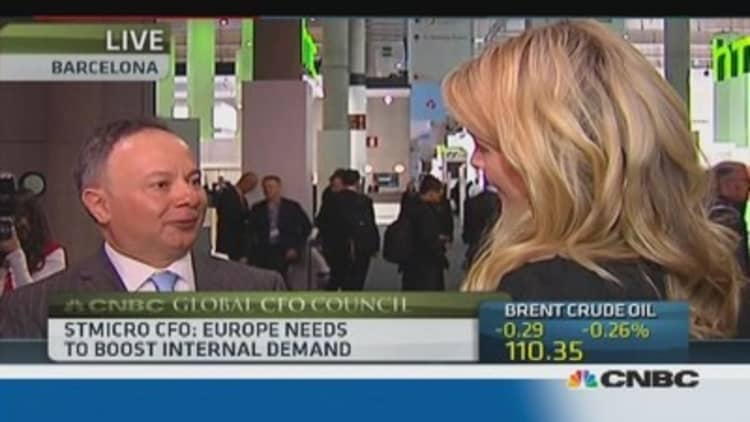Europe is over the worst of its economic crisis, with growth across the region forecast to be stronger than expected this year, the European Commission said on Tuesday.
The euro zone of 18 countries is forecast to grow 1.2 percent this year and 1.8 percent in 2015, following two years of contraction. Gross domestic product (GDP) in the 28-nation European Union (EU) is expected to see growth of 1.5 percent in 2014 and 2 percent next year.
The expectations for 2014 mark an upward revision of 0.1 percent points from the autumn forecasts by the Commission, which is the European Union's executive arm.
The fading impact of austerity and implementation of reforms in some of the euro zone's most vulnerable countries has helped the bloc turn a corner, the Commission said.
But it warned that a failure to continue with reforms, combined with "sustained very low inflation" in the euro area, would present risks to the rebalancing of the region's economy.
(Read more: Euro to strengthen even on ECB easing?)
"The worst of the crisis is behind us but this is not an invitation to be complacent," Ollie Rehn, the European commissioner for economic and monetary affairs, said at a press conference on Tuesday.
Greece, Spain and Italy - which were among the countries worst hit by the economic crisis and have suffered economic contractions over the past two years - look to be turning around, according to the Commission's winter forecast.
Greece is forecast to grow 0.6 percent in 2014 and 2.9 percent in 2015, while Spain is set to see 1 percent growth this year and 1.7 percent growth the following year.
Italy, amid optimism about new Prime Minister Matteo Renzi's thirst for reform, is expected to grow by 0.6 percent in 2014 and 1.2 percent next year. While the U.K. will see strong growth of 2.5 percent this year and 2.4 percent in 2015, according to the Commission.
(Read more: Foreign trade driving German growth)
In 2014, only Cyprus and Slovenia are expected to continue to register negative annual growth rates, but by 2015 all economies are expected to expand again.

"This economic recovery is expected to become broad-based across countries and to gain strength while at the same time becoming more balanced. As it is typical following deep financial crisis…the recovery remains modest and still fragile," Rehn said.
However, Europe is still battling with high unemployment. Joblessness in the euro zone remained at 12 percent in December, while in the EU it was 10.7 percent, according to official data.
The Commission warned it expects unemployment to see a "modest" rise this year, before declining towards 10.4 percent in the EU and 11.7 percent in the euro area by 2015.
(Read more: STMicroelectronics CFO: Euro zone needs demand boost)
On a country level, however, Spain's and Greece's rates of unemployment are expected to remain high - around 24 percent by 2015. While joblessness will stay above 10 percent in several other countries including Portugal and Cyprus.
Low inflation is expected to continue across the EU and euro zone, with a number of analysts worried about the risk of deflation. Investors are now looking to possible action by the European Central Bank, which could introduce measures to combat low inflation at its policy decision next week.
"It is really a steady but unspectacular recovery, and there is certainly evidence that the recovery has gained some momentum," Ben May, European economist at Capital Economics, told CNBC in a phone interview.
"Our view is that recovery won't be strong enough to push inflation up to great degree. We expect inflation to remain subdued."
—By CNBC's Arjun Kharpal: Follow him on Twitter @ArjunKharpal


